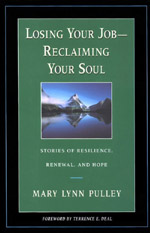 (Reprinted with permission from the Seattle Times, written by Eric Zoeckler.)
(Reprinted with permission from the Seattle Times, written by Eric Zoeckler.)
Although obscured by unprecedented job growth, the mere mention of downsizing these days is enough to cause most to break out in a cold sweat. Whether it’s the d-word or similar fuzzy substitutes like reorganization or reengineering, they all translate into one conclusion: job loss.
So it’s not surprising that these corporate euphemisms have assumed an almost universally negative connotation. But to Mary Lynn Pulley, principal of The Linkages Group, a Seattle workplace consulting firm, losing a job doesn’t have to be a time of despair. Instead, it can be the catalyst for opportunity, a chance to achieve a more meaningful and gratifying life.
People who approach job loss as a transformation rather than hoping for a quick career transition are more likely to emerge from the process more fulfilled, says Pulley, author of Losing Your Job—Reclaiming Your Soul. This requires an all-encompassing “attitude shift,” however, that includes removing your occupation from the dominant part of your personal definition.
Downsizing has not vanished in the wake of postrecessionary job growth. “The attention has shifted away because of the fast rate of job growth,” Pulley says. Yet the availability of jobs does not ease the sting of losing one you had, especially for professionals.
Pulley’s book offers paths for coping and renewing yourself through and beyond the naturally dark period following an involuntary job loss. For instance, it’s natural and necessary to grieve losing a job, she says. Sharing these feelings with friends, colleagues, and family members provides a healthy outlet.
Pulley cites two corporate executives who responded very differently to losing their jobs. One sent out 13,000 résumés, received little response and wound up disillusioned and angry. The other, as he saw a layoff approaching, decided to pursue a personal interest in ancient civilization. He earned a master’s degree and ended up a happy man cataloguing Greek coins at the Harvard University library.
The difference? Neither man ended up as “wealthy” as they were in their previous jobs. But the coin sorter demonstrated resiliency, the key to achieving a transformation after job loss, Pulley says. His example also shows that you can start a career transformation while still employed, especially in a job you dislike.
Researching her book, Pulley interviewed dozens of people who emerged happier and more fulfilled than they were prior to their layoffs. Their stories revealed these common threads:
-
They took time to think about where work fits into their lives and made value shifts in response.
-
They retained faith both in themselves and often spiritually, as well; they never lost hope.
-
They pictured themselves doing various things they thought they had always wanted to do.
-
They also used an extensive network of both personal and occupational friends to help research new career options.
Appetizer
Not for the Half-Hearted
Several years ago I went on a canoe trip on Abiquiu Lake in New Mexico. The guide reminded us that while canoeing, especially in turbulent waters, we must commit to the stroke. A weak or half-hearted stroke has the same effect as the wrong stroke—neither will get us where we want to go. Perhaps more fundamentally, we might ask ourselves why we are going there in the first place.
—from Losing Your Job—Reclaiming Your Soul